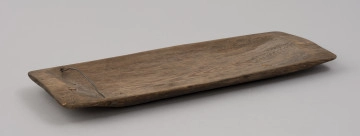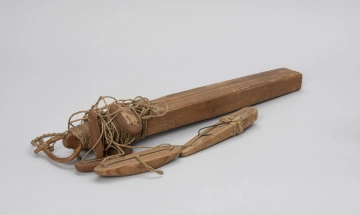
Tray for longlines storage
1901 — 1949
National Museum in Szczecin
Part of the collection: Middle Ages
One significant industry in the early medieval period was fishing. The extensive access to river, lake, floodplain and sea waters in Pomerania had a decisive influence on the development of fortified settlements and, later, centres of an early urban character. Archaeological finds provide the most information about the methods of exploitation of water bodies. Ichthyological material is an excellent source of knowledge on the quantity and species of fish that were caught and consumed. However, rings, hooks, bark floats, as well as clay or stone net weights shed light on the fishing methods and practices of the time. The net weight, discovered in the area of the former foothill settlement during excavations carried out in 1962 at archaeological site No. 2 in Kamień Pomorski (West Pomeranian Voivodeship), was used to weigh down pond and drift nets. Depending on the weight, number of weights and floats, it was possible for fishermen to set their nets at the appropriate depth. They were also used in seine fishing, which involved scooping fish into a net stretched between boats. Stone weights, also known as perch weights, are most commonly found in the archaeological material in the form of flat pebbles, with indentations on two opposite sides to prevent the cord from slipping, and flint rolls with natural openings. Grzegorz Durdyń
Author / creator
Object type
fishing net weight
Technique
knapping, grinding
Material
sandstone
Origin / acquisition method
field research
Creation time / dating
Creation / finding place
Owner
Muzeum Narodowe w Szczecinie
Identification number
Location / status

nieznany
1901 — 1949
National Museum in Szczecin

unknown
1901 — 1950
National Museum in Szczecin

unknown
1901 — 1950
National Museum in Szczecin
DISCOVER this TOPIC
Museum of King Jan III's Palace at Wilanów
DISCOVER this PATH
Educational path
0/500

We use cookies to make it easier for you to use our website and for statistical purposes. You can manage cookies by changing the settings of your web browser. More information in the Privacy Policy.
We use cookies to make it easier for you to use our website and for statistical purposes. You can manage cookies by changing the settings of your web browser. More information in the Privacy Policy.
Manage cookies:
This type of cookies is necessary for the website to function. You can change your browser settings to block them, but then the website will not work properly.
WYMAGANE
They are used to measure user engagement and generate statistics about the website to better understand how it is used. If you block this type of cookies, we will not be able to collect information about the use of the website and we will not be able to monitor its performance.